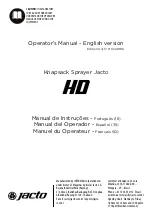
TOXIC FLUID HAZARD
+
ALWAYS
remove tip guard & tip to clean
AFTER
pump is turned off and the
pressure is relieved by following the
PRESSURE RELIEF PROCEDURE
.
+
Hazardous fluid or toxic fumes can cause serious injury or death if splashed in
eyes or on skin, inhaled or swallowed. Know the hazards of the fluid you are
using. Store and dispose of hazardous fluid according to manufacturer, local,
state and national guidelines.
+
ALWAYS
wear protective eyewear, gloves, clothing and respirator
as recommended by fluid manufacturer.
HOSES
+
Tighten all of the fluid connections securely before each use. High pressure
fluid can dislodge a loose coupling or allow high pressure spray to be emitted
from the coupling and result in an injection injury or serious bodily injury.
+
Only use hoses with a spring guard. The spring guard helps protect the hose
from kinks or other damage which could result in hose rupture and cause an
injection injury. Do not allow kinking or crushing of hoses or allow it to vibrate
against rough, sharp or hot surfaces.
+
Use only conductive fluid hoses for airless applications. Be sure the gun is
grounded through the hose connections. Use only high pressure airless hoses
with static wire which are approved for 3000 psi.
+
NEVER
use a damaged hose, which can result in hose failure or rupture and
cause an injection injury or other serious bodily injury or property damage.
Before each use, check entire hose for cuts, leaks, abrasions, bulging of the
cover, or damage or movement of couplings. If any of these conditions exist,
replace the hose immediately.
+
NEVER
use tape or any device to try to mend the hose as it cannot contain
the high pressure fluid.
NEVER ATTEMPT TO RECOUPLE THE HOSE.
It is not possible to recouple a high pressure hose .
12
QTech
Spray.com
GROUNDING
+
Ground the sprayer and other components in the system to reduce the risk of
static sparking, fire or explosion which can result in serious bodily injury and
property damage. For detailed instructions on how to ground, check your
local electrical code.
+
ALWAYS
ensure switch is in
OFF
position before plugging unit in.
Always ground all of these components:
1
Sprayer:
plug the power supply cord, or extension cord, each equipped with
an undamaged three
-
prong plug, into a properly grounded outlet.
DO NOT
USE AN ADAPTER.
Use only a 3 wire extension cord that has a grounding
plug, and a receptacle that will accept the grounding plug on the product.
Make sure your extension cord is in good condition. When using an extension
cord, be sure to use one heavy enough to carry the current your product will
draw. If in doubt, use the next heavier gauge.
2
Fluid hose:
use only grounded hoses.
3
Spray gun
or dispensing valve: grounding is obtained through connection to
a properly grounded fluid hose and pump.
4
All solvent pails must be conductive metal material and properly grounded.
Do not place on a non conductive insulating surface unless a ground wire is
added to a true earth such as a metal water pipe. ALWAYS
ensure fire
extinguishing equipment is readily available and properly maintained.
FLUSHING SAFETY
WHEN SPRAYING & CLEANING WITH FLAMMABLE PAINTS AND THINNERS
1
When spraying with flammable liquids, the unit must be located a minimum
of
25 feet away from the spraying area in a well ventilated area. Ventilation
must
be sufficient enough to prevent the accumulation of vapors.
2
To eliminate electrostatic discharge, ground the spray unit, paint bucket and
spraying object. See
GROUNDING
. Use only high pressure airless hoses
approved for 3000 psi which is conductive.
3
Remove the spray tip before flushing. Hold the metal part of the gun firmly to
the side of a metal pail & use the lowest possible fluid pressure during flushing.
4
Never use high pressure in the cleaning process.
USE MINIMUM PRESSURE
.
5
Do not smoke in spraying/cleaning area.
NEVER use cleaning solvents with flash points below 60°C/140°F. Some of these
are: acetone, benzene, ether, gasoline, naphtha. Consult your supplier if in doubt.
13
QTech
QT290C Carry Airless Sprayer


































